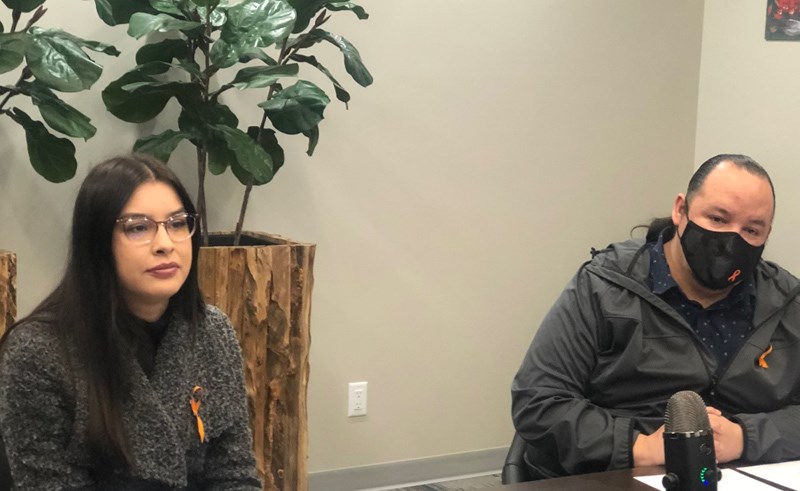Lheidli T’enneh First Nation and McLeod Lake Indian Band (MLIB) have formed an Indigenous Education Leadership Table (IELT) to work towards Indigenous education reforms at School District No. 57.
The two nations held a press conference announcing the formation of the group to implement the recommendations in the Special Advisors Report, which was released in August 2021, and examined governance practices in the district and confirmed systemic anti-Indigenous racism within the district.
Lheidli T’enneh and McLeod Lake have worked together for the past few years to share their concerns of systemic racism, the lack of accountability and proof that target funding is being spent on Indigenous students.
“This new table is hopefully going to raise awareness of Indigenous values, protocols and Indigenous ways of knowing. It is an opportunity for us to define a new relationship with the school district and uphold Indigenous laws,” said MLIB deputy chief Jayde Chingee.
“We have a chance to do something new here, we don’t want the same old — we want our own path.”
She explained that the IELT will represent the two communities at the same level as the SD57 board of education and it will work cooperatively and collaboratively with senior administration to implement the recommendations of the special advisors.
The special advisors made over 40 recommendations to improve the educational experiences for indigenous students in SD57 and to repair the relationship with the two Nations and other Indigenous organizations.
“Our nations have always played a roll in the school district but it was an advisory capacity, whereas this will be more of a leadership and hands on support for our students to look at how we can actually offer feedback and put that into motion,” explained Lheidli T’enneh councillor Joshua Seymour, adding the table would be more of a government-to-government process.
Chingee explained that the IELT is an Indigenous-led process and is being defined by the communities rather than the school district or the B.C. government.
“I think it is an opportunity for the school district and the board to come to our Pitt House and seek consultation at our table and at the same time they are learning Indigenous protocols and respecting and standing up those protocols that have been so lost that we need to bring back.”
Seymour added they are looking at bringing in the Balhats or potlach system, which would have been the traditional system within the territories of McLeod Lake and Lheidli T’enneh.
“The true reconciliation that I have seen come from within the district is when we held the first Balhats in our territory in 71 years,” added Seymour.
In November 2019, an All Clans Balhats was held to celebrate the partnership between the Lheidli T’enneh and SD57.
“Having that Balhats was one of those reconciliation steps that we took and it exposed the school district to the type of governance that Lheidli T’enneh would have and we are looking to ultilize it so we are can improve education in the system that is used right now.”
Chingee said the IELT will work towards improved graduation rates for Indigenous students, improve the k-12 educational experience for Indigenous students and in turn improve student success for all students.
“We are confident the EILT is the mechanism to achieve this.”
Both nations are also still pushing for two additional dedicated seats at the school board table for an Indigenous trustee from each nation.
This was echoed by one of the recommendations in the special advisors report. The report recommended the province develop a policy framework that requires all school boards to create mechanisms that give First Peoples voice and authentic engagement in decision making processes for Indigenous learners, i.e. Indigenous Trustees.
“The special advisors report made that recommendation to that ministry so we are still awaiting word on their internal changes to legislation, processes and policies on how we can actually elect Indigenous trustees,” explained Chingee.
“As Indigenous nations, we really have to live in two worlds: the colonial world and our Indigenous world, so having that seat as trustees would be living in the colonial world and then us bringing in the Indigenous Education Leadership table we are bringing in our Indigenous worldview and ways of knowing. Those are the two worlds we have to live in.”
Seymour added that the two Nations preference is to work with SD57 to repair the relationship with district and to work tirelessly to improve graduation for Indigenous students and improve their educational experiences in SD57.
“We are announcing today that we are ready to roll up our sleeves and work with the Board of Education and senior administration to reform and transform the current K-12 system in SD57 and create one that provides equal opportunity for Indigenous and non-Indigenous students to pursue their dreams and achieve their educational goals.”






